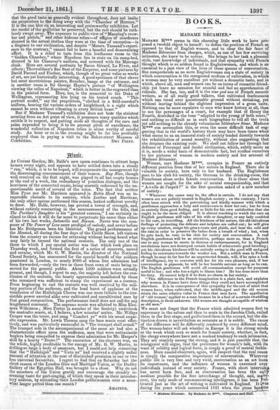AT Covent Garden; Mr. Balfe's new opera continues to attract
large houses every night, and appears to have settled down into a steady "run," which, it is to be hoped, will compensate the management for the discouraging commencement of their season. Buy Bias, though well received on the first night, was played to all but empty houses at the end of a week, the redundancy of pointless dialogue, and ' the heaviness of the concerted music, being scarcely redeemed by the un- questionable merit of several of the solos. The fact that neither Miss Pyne nor Mr. Harrison appeared in Robin Hood was an in- superable obstacle to its success, while Lurline and Maritana, the only other operas performed this season, lacked sufficient novelty to draw. Mr. Balfe, however, has proved a tower of strength, and, without entirely concurring in. the announcement of the bills, that The Puritan's Daughter is his "greatest success," I am certainly in- clined to think it will do far more to perpetuate Ls name than either of his two last works, Satanella and Blanca. Never was the com- poser of The Power of Love more prodigal of melody, and never before has Mr. Bridgeman been his librettist. The grand performances of the Messiah, all during the four days of the Cattle Show, left visitors from the country no excuse for returning without having heard what may fairly be termed the national oratorio. The only one of the three to which I pay special notice was that which took place on Thursday week, and formed the first of a series of concerts, sacred and secular, which Mr. G. W. Martin, the director of the National Choral Society, has announced for the special benefit of the soldiers quartered in London, to nearly 2000 of whom free admission had been. forwarded,—only the two or three front rows of seats being re- served for the general public. About 1500 soldiers were actually present, and though, I regret to say, the majority left before the con- clusion of the oratorio, the hearty appreciation manifested by those who remained was sufficient to stamp the experiment as a success. From beginning to end the oratorio was welL received by the mili- tary portion of the audience, and the loud burst of applause at the conclusion of the Hallelujah Chorus was one more tribute to the irre- sistible power exerted alike over cultivated and uncultivated ears by that grand composition. The performance itself does not call for any lengthened comment. The soprano music was allotted to Miss Eleo- nora. Wilkinson; Miss Porter (a member of the Society) undertook the contralto music, at, I believe, a few minutes' notice. Mr. Wilbye Cooper was the tenor, and sang "Comfort ye" with his usual exqui- site expression. Mr. Lewis Thomas sang the bass music most effec- tively, and was particularly successful in "The trumpet shall sound." The trumpet solo in the accompaniment of the same air had also a characteristic effect upon the audience, men that were enthusiastic buglers being compelled to express their admiration for Mr. Harpees skill by a hearty "Bravo l" The execution of the choruses was, on the whole, highly creditable to the energy. of Mr. G. W. Martin, in drilling so large a body of amateurs, but I could not help remarking that the "Hallelujah" and "Unto us" had received a slightly unfair amount of attention at the cost of diminished precision in one or two less universal favourites. I regret to find that on Saturday last the short season of the London Glee and Madrigal Union, at the Dudley Gallery of the Egyptian Hall, was brought to a close. Why do not the members of the Union gratify and encourage the steadily in- creasing taste for part-singing, of which they speak in their introduc- tory- address, by extending their London performances over a some- whet longer period than one month?
AmAmon.






























 Previous page
Previous page